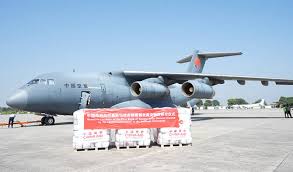China Extends Flood Relief to Pakistan as Bilateral Scientific Cooperation Achieves Twin Breakthroughs
ISLAMABAD, September 29 : China has reaffirmed its unwavering support for Pakistan, delivering emergency flood relief while also partnering in groundbreaking agricultural research that promises to strengthen Pakistan’s rice industry.
China Sends Emergency Aid for Flood Victims
Two Chinese military transport aircraft carrying emergency flood relief assistance landed at Nur Khan Airbase in Rawalpindi on September 28.
The first consignment, part of Beijing’s 100-million-yuan aid package, included 300 tents and 9,000 blankets. The delivery follows an earlier $2 million cash donation announced by China.
Speaking at the handover ceremony, Ambassador Jiang Zaidong reiterated Beijing’s commitment: “Whenever Pakistan needs us, China will always be there.”
Federal ministers Tariq Fazal Chaudhry and Amir Muqam attended the ceremony. Muqam, who also serves as Minister for Kashmir Affairs and Gilgit-Baltistan, expressed gratitude, calling the assistance a “timely gesture” that will provide immediate relief to displaced families.
Twin Research Breakthroughs in Rice and Food Science
Meanwhile, Pakistani and Chinese scientists have jointly published two high-impact studies that address post-harvest challenges in rice production and food processing.
The first study, published in the Journal of Agriculture and Food Research, introduced an optimized drying process for extra-long rice. Led by Dr. Faraz Ahmad Khan of the Rice Research Institute Kala Shah Kaku (RRI-KSK), the method—drying at 53°C for 60 minutes with 17.5% initial moisture—produced superior results in milling, cooking quality, and grain integrity.
The findings are significant for Pakistan, where rice is the second-largest export earner, but post-harvest losses remain high. Chinese researcher Naveed Mahmood, a co-author, stressed that adopting this method could boost Pakistan’s competitiveness in over 66 global markets. The study also applied artificial intelligence (AI), using k-nearest neighbors (k-NN) modeling to predict rice quality outcomes.
The second study, published in Food Chemistry, examined ultrasound pre-treatment of soy protein isolate (SPI) before various drying methods. It revealed that ultrasound exposure altered amino acid stability and functional properties. Spray drying enhanced foaming and reduced browning, while freeze-drying preserved emulsification and oil-holding capacity.
The Pakistani team led data analysis and modeling, while Chinese counterparts contributed advanced laboratory precision. Together, the studies provide evidence-backed strategies for rice breeders, processors, and exporters.
Expanding Agricultural Cooperation
RRI-KSK is deepening collaboration with Chinese institutions under the Prime Minister’s Initiative for Capacity Building of 1,000 Agricultural Graduates. Recently, three Pakistani scientists were selected for six months of hands-on training in China.
The institute noted that these research breakthroughs will not only reduce losses and improve quality in rice production but also strengthen Pakistan-China scientific cooperation in agriculture and food security.

